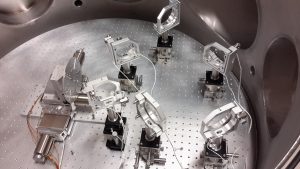 This project was the core of the funding proposal for the construction of the L2A2. The aim of the project is to develop the technology required for the competitive production of radioisotopes used in positron-emission tomography (PET) by using laser-particle accelerators. The main argument is that present technologies for the production of PET isotopes are based on a centralized production and distribution scheme because of the rather large cost of the infrastructure required. Compact laser-accelerators could become the enabling technology for the on-demand production of PET radioisotopes, opening the possibility of using short-lived isotopes, such as 11C, 13N or 15O, of special interest for the diagnostic of neurodegenerative and cardiovascular diseases.
This project was the core of the funding proposal for the construction of the L2A2. The aim of the project is to develop the technology required for the competitive production of radioisotopes used in positron-emission tomography (PET) by using laser-particle accelerators. The main argument is that present technologies for the production of PET isotopes are based on a centralized production and distribution scheme because of the rather large cost of the infrastructure required. Compact laser-accelerators could become the enabling technology for the on-demand production of PET radioisotopes, opening the possibility of using short-lived isotopes, such as 11C, 13N or 15O, of special interest for the diagnostic of neurodegenerative and cardiovascular diseases.
The first milestone of this project is the design and construction of a laser-driven proton source delivering protons at energies above 10 MeV in a continuous operation mode at 10 Hz. For this purpose the L2A2 laser system is equipped with a high-energy laser line (1 J, 30 fs, 10 Hz). Focusing these laser pulses in few squared microns one can produce energy densities around 5 1019 W/cm2, sufficient for the acceleration of protons at the above mentioned energies. The continuous operation of a laser-plasma proton source requires the following developments:
– On-line laser pulses focusing systems.
– High repetition rate plasma-acceleration targets.
– On-line monitoring of the ion pulses.